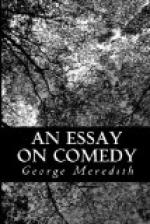Terence forwarded manuscript translations from Greece, that suffered shipwreck; he, who could have restored the treasure, died on the way home. The zealots of Byzantium completed the work of destruction. So we have the four comedies of Terence, numbering six of Menander, with a few sketches of plots—one of them, the Thesaurus, introduces a miser, whom we should have liked to contrast with Harpagon—and a multitude of small fragments of a sententious cast, fitted for quotation. Enough remains to make his greatness felt.
Without undervaluing other writers of Comedy, I think it may be said that Menander and Moliere stand alone specially as comic poets of the feelings and the idea. In each of them there is a conception of the Comic that refines even to pain, as in the Menedemus of the Heautontimorumenus, and in the Misanthrope. Menander and Moliere have given the principal types to Comedy hitherto. The Micio and Demea of the Adelphi, with their opposing views of the proper management of youth, are still alive; the Sganarelles and Arnolphes of the Ecole des Maris and the Ecole des Femmes, are not all buried. Tartuffe is the father of the hypocrites; Orgon of the dupes; Thraso, of the braggadocios; Alceste of the ‘Manlys’; Davus and Syrus of the intriguing valets, the Scapins and Figaros. Ladies that soar in the realms of Rose-Pink, whose language wears the nodding plumes of intellectual conceit, are traceable to Philaminte and Belise of the Femmes Savantes: and the mordant witty women have the tongue of Celimene. The reason is, that these two poets idealized upon life: the foundation of their types is real and in the quick, but they painted with spiritual strength, which is the solid in Art.
The idealistic conceptions of Comedy gives breadth and opportunities of daring to Comic genius, and helps to solve the difficulties it creates. How, for example, shall an audience be assured that an evident and monstrous dupe is actually deceived without being an absolute fool? In Le Tartuffe the note of high Comedy strikes when Orgon on his return home hears of his idol’s excellent appetite. ‘Le pauvre homme!’ he exclaims. He is told that the wife of his bosom has been unwell. ’Et Tartuffe?’ he asks, impatient to hear him spoken of, his mind suffused with the thought of Tartuffe, crazy with tenderness, and again he croons, ‘Le pauvre homme!’ It is the mother’s cry of pitying delight at a nurse’s recital of the feats in young animal gluttony of her cherished infant. After this masterstroke of the Comic, you not only put faith in Orgon’s roseate prepossession, you share it with him by comic sympathy, and can listen with no more than a tremble of the laughing muscles to the instance he gives of the sublime humanity of Tartuffe:
’Un rien presque suffit pour
le scandaliser,
Jusque-la, qu’il se vint l’autre
jour accuser
D’avoir pris une puce en faisant
sa priere,
Et de l’avoir tuee avec trop
de colere.’




